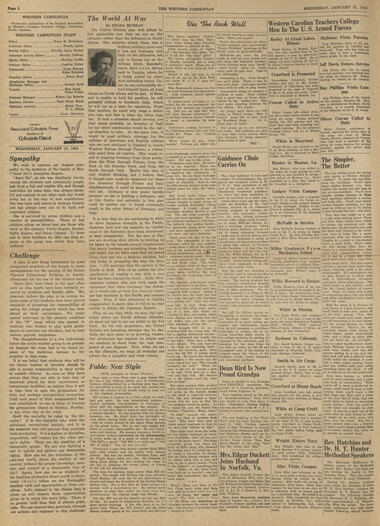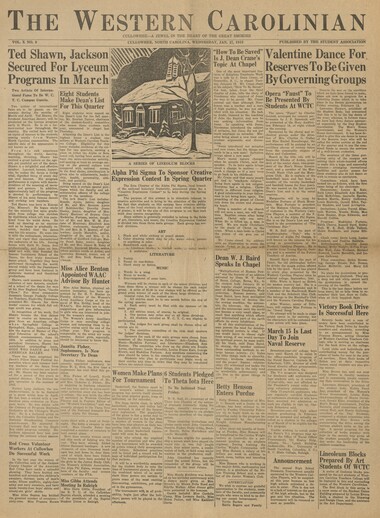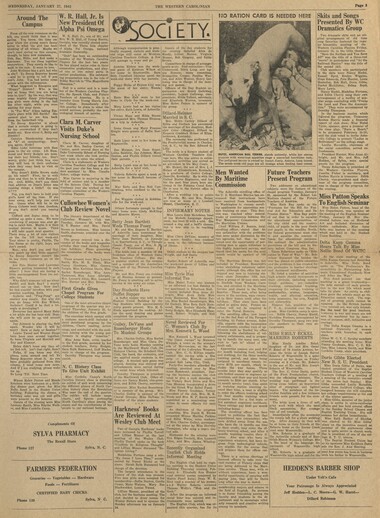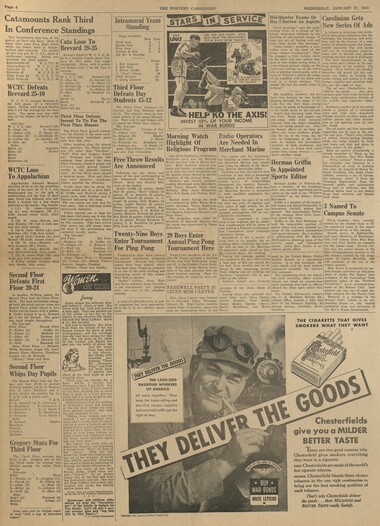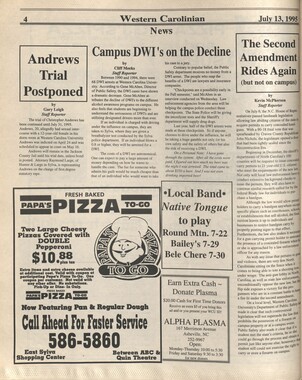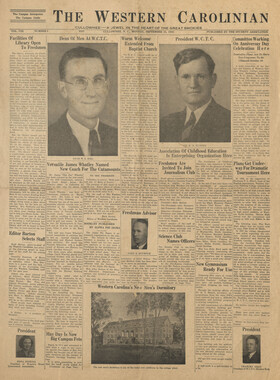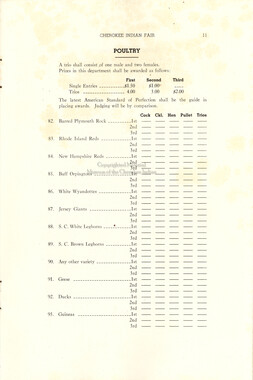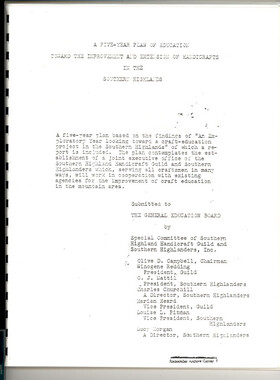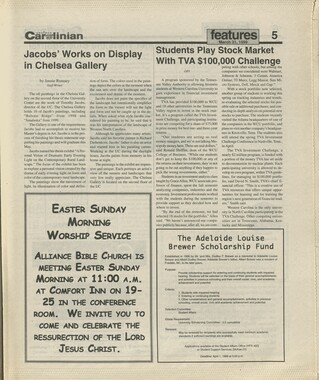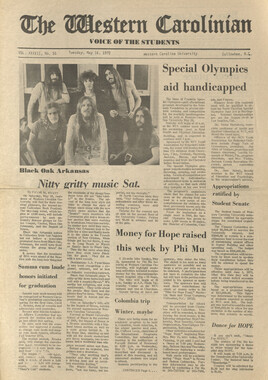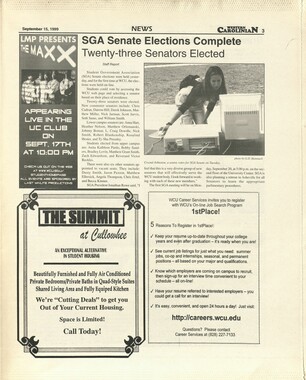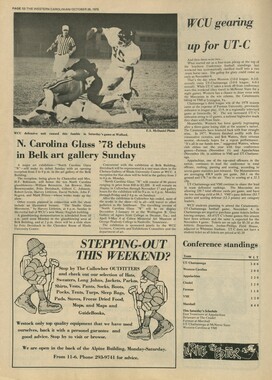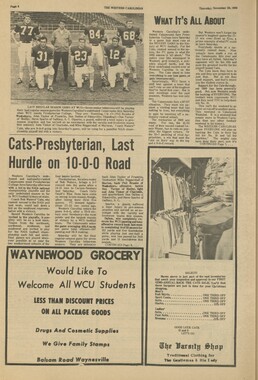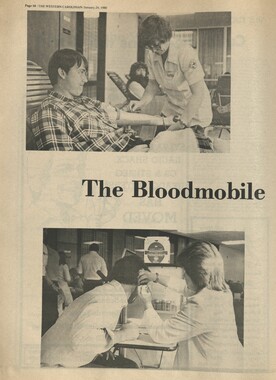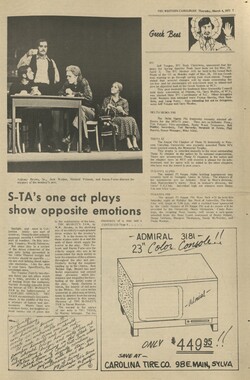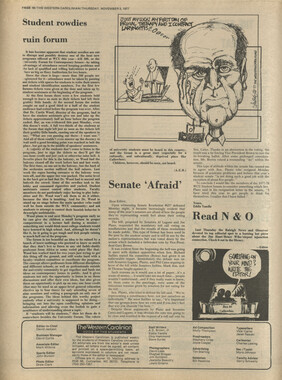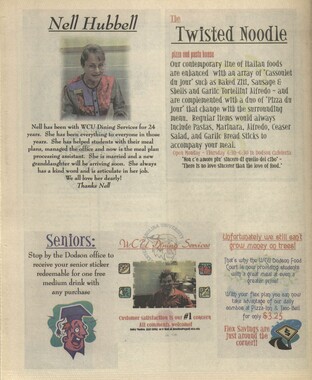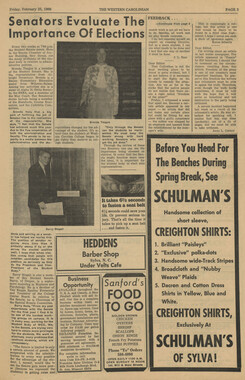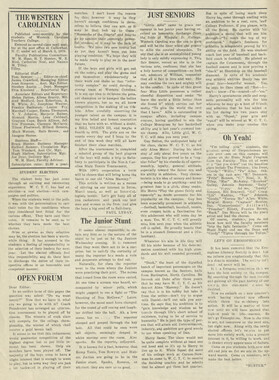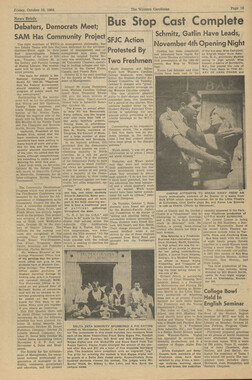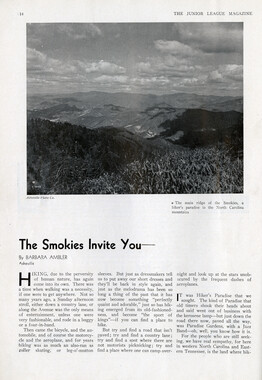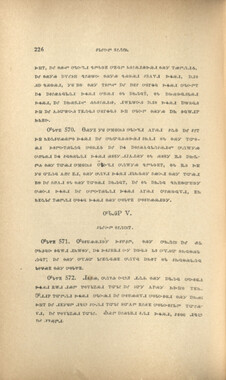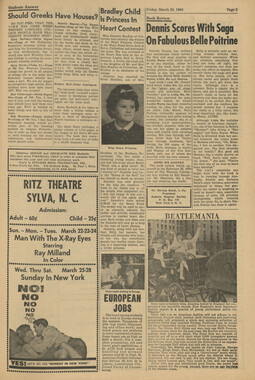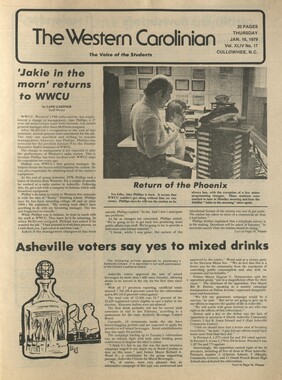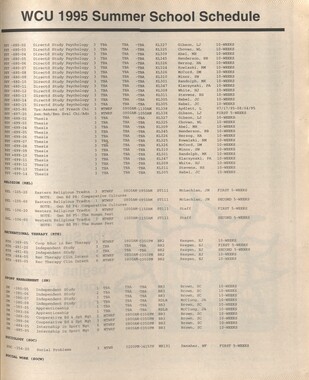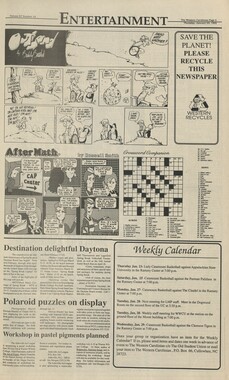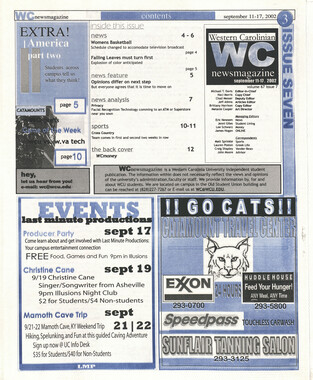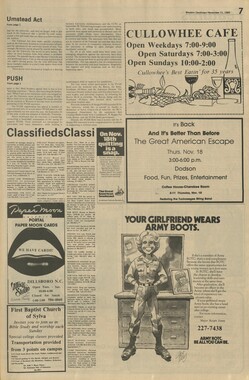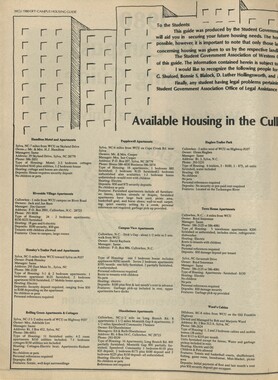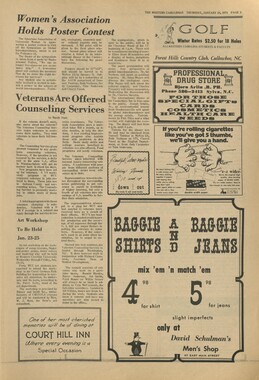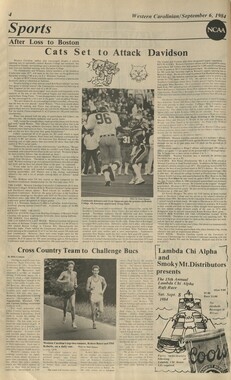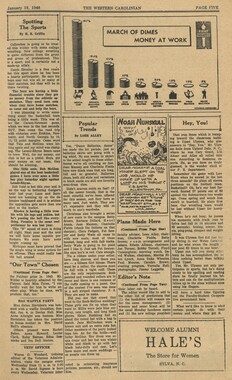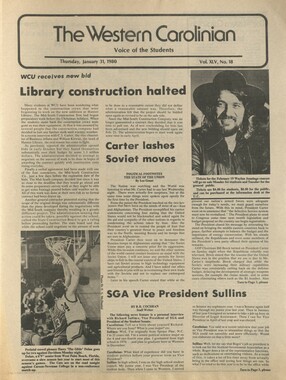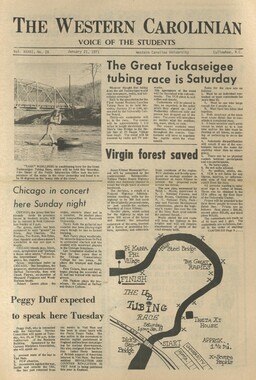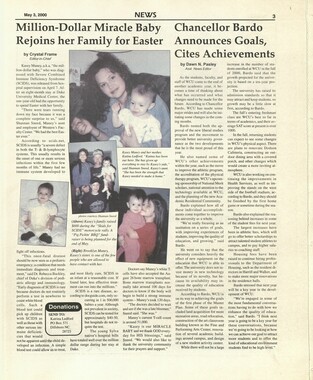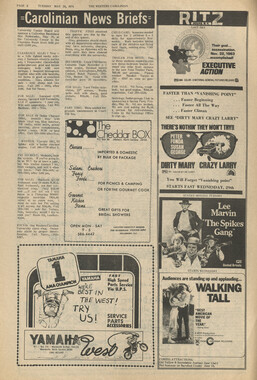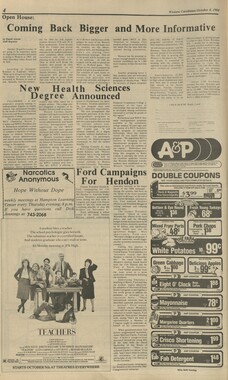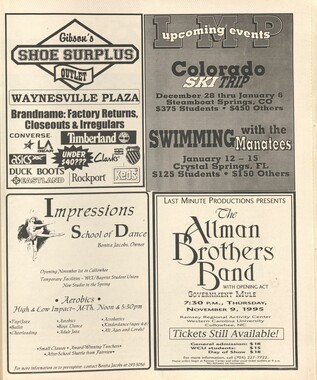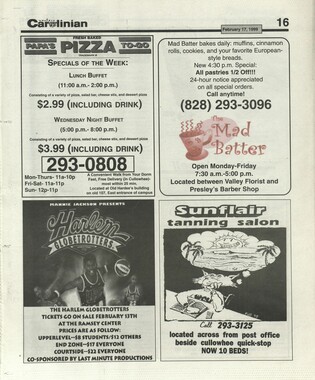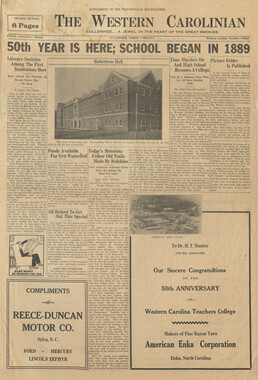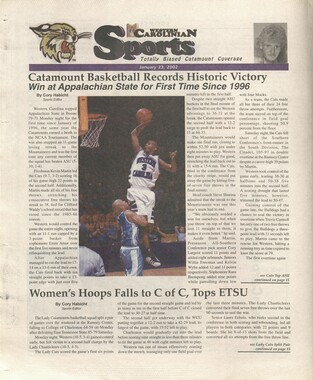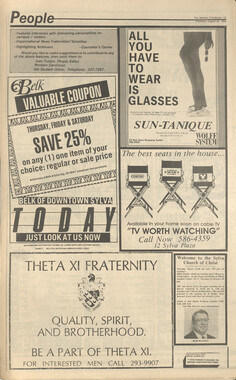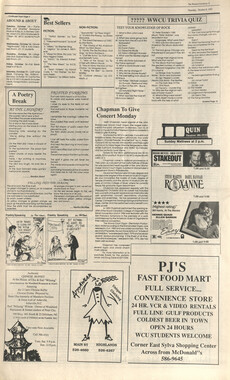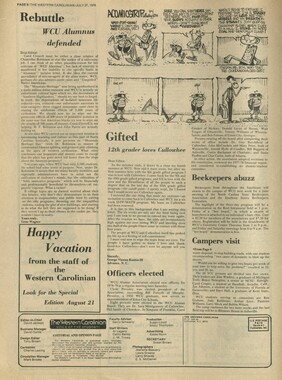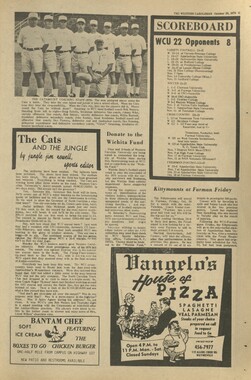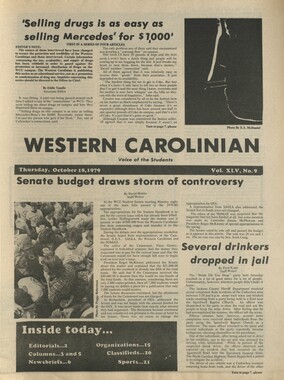Western Carolina University (20)
View all
- Canton Champion Fibre Company (2308)
- Cherokee Traditions (292)
- Civil War in Southern Appalachia (165)
- Craft Revival (1942)
- Great Smoky Mountains - A Park for America (2766)
- Highlights from Western Carolina University (430)
- Horace Kephart (941)
- Journeys Through Jackson (154)
- LGBTQIA+ Archive of Jackson County (85)
- Oral Histories of Western North Carolina (314)
- Picturing Appalachia (6772)
- Stories of Mountain Folk (413)
- Travel Western North Carolina (160)
- Western Carolina University Fine Art Museum Vitreograph Collection (129)
- Western Carolina University Herbarium (92)
- Western Carolina University: Making Memories (708)
- Western Carolina University Publications (2283)
- Western Carolina University Restricted Electronic Theses and Dissertations (146)
- Western North Carolina Regional Maps (71)
- World War II in Southern Appalachia (131)
University of North Carolina Asheville (6)
View all
- Western Carolina College (199)
- Western Carolina Teachers College (239)
- Western Carolina University (1792)
- Allanstand Cottage Industries (0)
- Appalachian National Park Association (0)
- Bennett, Kelly, 1890-1974 (0)
- Berry, Walter (0)
- Brasstown Carvers (0)
- Cain, Doreyl Ammons (0)
- Carver, George Washington, 1864?-1943 (0)
- Cathey, Joseph, 1803-1874 (0)
- Champion Fibre Company (0)
- Champion Paper and Fibre Company (0)
- Cherokee Indian Fair Association (0)
- Cherokee Language Program (0)
- Crittenden, Lorraine (0)
- Crowe, Amanda (0)
- Edmonston, Thomas Benton, 1842-1907 (0)
- Ensley, A. L. (Abraham Lincoln), 1865-1948 (0)
- Fromer, Irving Rhodes, 1913-1994 (0)
- George Butz (BFS 1907) (0)
- Goodrich, Frances Louisa (0)
- Grant, George Alexander, 1891-1964 (0)
- Heard, Marian Gladys (0)
- Kephart, Calvin, 1883-1969 (0)
- Kephart, Horace, 1862-1931 (0)
- Kephart, Laura, 1862-1954 (0)
- Laney, Gideon Thomas, 1889-1976 (0)
- Masa, George, 1881-1933 (0)
- McElhinney, William Julian, 1896-1953 (0)
- Niggli, Josephina, 1910-1983 (0)
- North Carolina Park Commission (0)
- Osborne, Kezia Stradley (0)
- Owens, Samuel Robert, 1918-1995 (0)
- Penland Weavers and Potters (0)
- Rhodes, Judy (0)
- Roberts, Vivienne (0)
- Roth, Albert, 1890-1974 (0)
- Schenck, Carl Alwin, 1868-1955 (0)
- Sherrill's Photography Studio (0)
- Smith, Edward Clark (0)
- Southern Highland Handicraft Guild (0)
- Southern Highlanders, Inc. (0)
- Stalcup, Jesse Bryson (0)
- Stearns, I. K. (0)
- Thompson, James Edward, 1880-1976 (0)
- United States. Indian Arts and Crafts Board (0)
- USFS (0)
- Vance, Zebulon Baird, 1830-1894 (0)
- Weaver, Zebulon, 1872-1948 (0)
- Western Carolina University. Mountain Heritage Center (0)
- Whitman, Walt, 1819-1892 (0)
- Wilburn, Hiram Coleman, 1880-1967 (0)
- Williams, Isadora (0)
- 1920s (57)
- 1930s (69)
- 1940s (114)
- 1950s (66)
- 1960s (314)
- 1970s (599)
- 1980s (406)
- 1990s (379)
- 2000s (195)
- 2010s (83)
- 1600s (0)
- 1700s (0)
- 1800s (0)
- 1810s (0)
- 1820s (0)
- 1830s (0)
- 1840s (0)
- 1850s (0)
- 1860s (0)
- 1870s (0)
- 1880s (0)
- 1890s (0)
- 1900s (0)
- 1910s (0)
- 2020s (0)
- Jackson County (N.C.) (2282)
- Appalachian Region, Southern (0)
- Asheville (N.C.) (0)
- Avery County (N.C.) (0)
- Blount County (Tenn.) (0)
- Buncombe County (N.C.) (0)
- Cherokee County (N.C.) (0)
- Clay County (N.C.) (0)
- Graham County (N.C.) (0)
- Great Smoky Mountains National Park (N.C. and Tenn.) (0)
- Haywood County (N.C.) (0)
- Henderson County (N.C.) (0)
- Knox County (Tenn.) (0)
- Knoxville (Tenn.) (0)
- Lake Santeetlah (N.C.) (0)
- Macon County (N.C.) (0)
- Madison County (N.C.) (0)
- McDowell County (N.C.) (0)
- Mitchell County (N.C.) (0)
- Polk County (N.C.) (0)
- Qualla Boundary (0)
- Rutherford County (N.C.) (0)
- Swain County (N.C.) (0)
- Transylvania County (N.C.) (0)
- Watauga County (N.C.) (0)
- Waynesville (N.C.) (0)
- Yancey County (N.C.) (0)
- Newsletters (510)
- Publications (documents) (1773)
- Aerial Photographs (0)
- Aerial Views (0)
- Albums (books) (0)
- Articles (0)
- Artifacts (object Genre) (0)
- Bibliographies (0)
- Biography (general Genre) (0)
- Cards (information Artifacts) (0)
- Clippings (information Artifacts) (0)
- Crafts (art Genres) (0)
- Depictions (visual Works) (0)
- Design Drawings (0)
- Drawings (visual Works) (0)
- Envelopes (0)
- Facsimiles (reproductions) (0)
- Fiction (general Genre) (0)
- Financial Records (0)
- Fliers (printed Matter) (0)
- Glass Plate Negatives (0)
- Guidebooks (0)
- Internegatives (0)
- Interviews (0)
- Land Surveys (0)
- Letters (correspondence) (0)
- Manuscripts (documents) (0)
- Maps (documents) (0)
- Memorandums (0)
- Minutes (administrative Records) (0)
- Negatives (photographs) (0)
- Newspapers (0)
- Occupation Currency (0)
- Paintings (visual Works) (0)
- Pen And Ink Drawings (0)
- Periodicals (0)
- Personal Narratives (0)
- Photographs (0)
- Plans (maps) (0)
- Poetry (0)
- Portraits (0)
- Postcards (0)
- Programs (documents) (0)
- Questionnaires (0)
- Scrapbooks (0)
- Sheet Music (0)
- Slides (photographs) (0)
- Songs (musical Compositions) (0)
- Sound Recordings (0)
- Specimens (0)
- Speeches (documents) (0)
- Text Messages (0)
- Tintypes (photographs) (0)
- Transcripts (0)
- Video Recordings (physical Artifacts) (0)
- Vitreographs (0)
- The Reporter, Western Carolina University (510)
- WCU Students Newspapers Collection (1744)
- A.L. Ensley Collection (0)
- Appalachian Industrial School Records (0)
- Appalachian National Park Association Records (0)
- Axley-Meroney Collection (0)
- Bayard Wootten Photograph Collection (0)
- Bethel Rural Community Organization Collection (0)
- Blumer Collection (0)
- C.W. Slagle Collection (0)
- Canton Area Historical Museum (0)
- Carlos C. Campbell Collection (0)
- Cataloochee History Project (0)
- Cherokee Studies Collection (0)
- Daisy Dame Photograph Album (0)
- Daniel Boone VI Collection (0)
- Doris Ulmann Photograph Collection (0)
- Elizabeth H. Lasley Collection (0)
- Elizabeth Woolworth Szold Fleharty Collection (0)
- Frank Fry Collection (0)
- George Masa Collection (0)
- Gideon Laney Collection (0)
- Hazel Scarborough Collection (0)
- Hiram C. Wilburn Papers (0)
- Historic Photographs Collection (0)
- Horace Kephart Collection (0)
- Humbard Collection (0)
- Hunter and Weaver Families Collection (0)
- I. D. Blumenthal Collection (0)
- Isadora Williams Collection (0)
- Jesse Bryson Stalcup Collection (0)
- Jim Thompson Collection (0)
- John B. Battle Collection (0)
- John C. Campbell Folk School Records (0)
- John Parris Collection (0)
- Judaculla Rock project (0)
- Kelly Bennett Collection (0)
- Love Family Papers (0)
- Major Wiley Parris Civil War Letters (0)
- Map Collection (0)
- McFee-Misemer Civil War Letters (0)
- Mountain Heritage Center Collection (0)
- Norburn - Robertson - Thomson Families Collection (0)
- Pauline Hood Collection (0)
- Pre-Guild Collection (0)
- Qualla Arts and Crafts Mutual Collection (0)
- R.A. Romanes Collection (0)
- Rosser H. Taylor Collection (0)
- Samuel Robert Owens Collection (0)
- Sara Madison Collection (0)
- Sherrill Studio Photo Collection (0)
- Smoky Mountains Hiking Club Collection (0)
- Stories of Mountain Folk - Radio Programs (0)
- Venoy and Elizabeth Reed Collection (0)
- WCU Gender and Sexuality Oral History Project (0)
- WCU Mountain Heritage Center Oral Histories (0)
- WCU Oral History Collection - Mountain People, Mountain Lives (0)
- Western North Carolina Tomorrow Black Oral History Project (0)
- William Williams Stringfield Collection (0)
- Zebulon Weaver Collection (0)
- College student newspapers and periodicals (1769)
- African Americans (0)
- Appalachian Trail (0)
- Artisans (0)
- Cherokee art (0)
- Cherokee artists -- North Carolina (0)
- Cherokee language (0)
- Cherokee pottery (0)
- Cherokee women (0)
- Church buildings (0)
- Civilian Conservation Corps (U.S.) (0)
- Dams (0)
- Dance (0)
- Education (0)
- Floods (0)
- Folk music (0)
- Forced removal, 1813-1903 (0)
- Forest conservation (0)
- Forests and forestry (0)
- Gender nonconformity (0)
- Great Smoky Mountains National Park (N.C. and Tenn.) (0)
- Hunting (0)
- Landscape photography (0)
- Logging (0)
- Maps (0)
- Mines and mineral resources (0)
- North Carolina -- Maps (0)
- Paper industry (0)
- Postcards (0)
- Pottery (0)
- Railroad trains (0)
- Rural electrification -- North Carolina, Western (0)
- School integration -- Southern States (0)
- Segregation -- North Carolina, Western (0)
- Slavery (0)
- Sports (0)
- Storytelling (0)
- Waterfalls -- Great Smoky Mountains (N.C. and Tenn.) (0)
- Weaving -- Appalachian Region, Southern (0)
- Wood-carving -- Appalachian Region, Southern (0)
- World War, 1939-1945 (0)
- Text (2283)
- MovingImage (0)
- Sound (0)
- StillImage (0)
Western Carolinian Volume 10 Number 08
Item
Item’s are ‘child’ level descriptions to ‘parent’ objects, (e.g. one page of a whole book).
-
-
Page 2 THE WESTERN CAROLINIAN WEDNESDAY, JANUARY 27, I943 WESTERN CAROLINIAN Bi-monthly publication of the Student Association at Western Carolina Teachers College, Cullowhee, North Carolina. WESTERN CAROLINIAN STAFF Editor Helen M. Hartshorn Associate Editor Roselle Ayers Society Editor Dorothy Jeane Ensley Assistant Society Editor Beverly Godfrey Sports Editor Herman Griffin Feature Editor Juanita Fisher Columnists Zelda Murray Edna Hawkins Headline Editor Selma Boyd Circulation Manager and Exchange Editor ~ Russell Byrd Typists - Max Beam Violet Fisher Business Manager Walter Lee Roberts Business Advisor - Ruth Oliver Hinds Editorial Advisors Mabel Tyre P. L. Elliott Typist Doris Ghormley Member Associated Collefciale Press Distributor of 1 Cblle&iateDi6est WEDNESDAY, JANUARY 27, 1943 Sympathy We wish to express our deepest sympathy to the members of the family of Mrs. ("Aunt Sis") Josephine Rogers. "Aunt Sis", as she was familiarly known among the students and community people, had lived a full and replete life, and though bedridden for some time, was always cheerful and anxious to see what each day would bring her in the way of new experiences. She was born and reared in Jackson County and has always been one of its loyal and respected citizens. She is survived by seven children and a number of grandchildren. Those of her children whom we know best are those who work on the campus: Vertie Rogers, Burkes, Hallie Rogers, and Daisy Coward. To them and to their brothers we offer our deep regrets at the great loss which they have suffered. Challenge A plan is now being formulated by some designated members of the Senate to make arrangements for the opening of the Breese Physical Educational Building on Sunday afternoons for the use of the student body. There have been times in the past when such an idea might have been cordially received by students and faculty alike. We, however, believe the plan to be unwise because some of the students here have proved incapable of accepting the responsibility of caring for college property which has been placed at their convenience. We make special reference to the present condition of the "W" room which was opened to students who wished to play quiet parlor games as carroms and checkers, and to read various popular magazines. The thoughtlessness of a few individuals forces the entire student group to be punished, because the room had to be closed because of the malicious damage to the property in that room. It is our belief that students who will be the future leaders of America should be able to accept responsibility in their stride as capable citizens. As soon as they have proved that they are able to take care of materials placed for their convenience as recreational facilities, we believe that it will be time then to open the gymnasium for their and perhaps unsupervised recreation. Until such proof of their responsibility has been established, we are in favor of keeping the gymnasium closed on Sunday, Monday, or any other day of the week. . Shall the majority be ruled by the minority? It is the majority who want the additional recreational periods, and it is the minority who will prevent that program from developing. It is a matter of discipline, cooperation, and respect for the other person's rights. These are the qualities of a democratic people. We are now fighting a war to uphold and protect our democratic rights. How can we, the helmsmen of the post-war world, direct the destiny of our country without the proper knowledge, exercise, and control of a democratic way of life? Again, how can we as students of the teaching profession direct youth in democratic ideals unless we are thoroughly familiar with and appreciative of them ourselves. Let's respond to the charge that is given us and respect those opportunities given us to enjoy life more fully. There is no greater trait than that of sincere gratitude. We can express that gratitude through our actions and response to this challenge. The World At War By ZELDA MURRAY The United Nations may well afford to feel optimistim now that we are on the offensive rather than the defensive in North Africa. Our surprise attack there was a __ brilliant military move and lit has put Germany and I Italy on the defensive, not § only in Russia but on the I African front. Rommel's £ forces have been driven d back to Tunisia, where he I is being joined by other Axis defending forces. Un. less he can successfully defend himself there, all Axis claims on North Africa will be lost. If Rommel is unable to hold his position, he will probably retreat to Southern Italy, which he will use as a base for operation. From that position, he could only wage a defensive war, and that is what the Allies hope for. If such a situation should develop, and that seems probable, an invasion of Italy by our brave commandos would be the logical direction to take. At the same time, it would be good military strategy for the millions of American and English soldiers who are now stationed in England to invade Western Europe through France, a vulnerable point from all reports. This would result in trapping Germany from three points: from the West through France, from the East on the Russian front, and from the South through Italy. Maybe this plan is only wishful thinking, but I believe that if enough men could be mustered for these two invasions through France and Italy simultaneously, it could be successfully carried out. Germany is now under terrific pressure as she is fighting a defensive war on two fronts, and certainly is this plan could be carried out, it would eventually result in the utter defeat of Germany and Italy. It is true that we are continuing to whittle down Japanese strength in the Pacific. Japanese land and sea assaults on Guadalcanal in the Solomons have been abandoned, at least temporarily. Yet, the men of Nippon are devoting their efforts to building up air bases on the islands around Guadalcanal. Our heavy bombers are attacking them day and night, but we have seen that air power alone does not win a decisive decision, but only helps in preparing the way for invasion. I still maintain that the picture in the Pacific is dark. Few of us realize the true significance of waging a war with a race that has been trained for death. Eddie Rick- enbacker realizes this and even made the statement that when Germany was defeated, it would take at least five years to regain our lost territory in the Pacific and conquer Japan. Even if this statement is slightly exaggerated, it shows that it will be no easy matter to defeat the Japanese Empire. Thus we see that while we may feel optimistic about our North African offensive, we must not fail to see our plight in the Far East. As the war progresses, the United Nations are becoming stronger day by day, while the Axis seem to be growing weaker. Our production has reached its height and we continue to draw from the vast manpower at our disposal. Now, when we are on the offensive, we must all redouble our efforts for a complete and total victory. Via <1lte. (lock Wall Fable: New Style (With apologies to James Thurber) Once upon a time there was a guy named Bill. He was a big, hulking fellow, sort of nondescript features distinguished by a flashing grin that like the sun behind a cloud on an April day, lurked just behind the corners of his mouth ready to come out on the slightest provocation. Bill became a student in a little college in—well, just any state. He was immediately popular— elected president, vice-president, or chairman of about half the organizations on the campus. In short, in less time than it takes to read this, he was a campus big-shot. He was popular with the faculty members, too. He didn't burn the mid-night oil very often—during finals was about the only time —and he rarely ranked in the upper three percent on the grade curve. But no one ever caught Bill Jones in a mean, contemptible act. He was frank, open, and fearless. His honesty became a traditon, and sports writers commented on his sportmanship in every write up of a game in which he played. "Old Bill's a sport," "Old Bill is a swell guy." "Old Bill is white." Yes, he was popular. Eventually a cute little blonde number filled Bill's days with wonder and his nights with uneasy dreams. She was his mother, Veronica Lake, and the Virgin Mary rolled into one. He dreamed of doing great things for her—writing his name in the sky or dumping the crown jewels of Persia in her lap for playthings. The time for heroism came sooner than Bill expected. One bright fall Sunday the Japs attacked Pearl Harbor; the next day he sat tight-lipped in chapel and heard the President of the United States declare war. For a few days he went around the campus with a preoccupied air. He missed more questions in class than usual; his smile came less spontaneously; his ringing laugh was forced. One day Bill cut all his classes—no one saw him all day. At supper he reappeared, however, his ol 1 good nature beaming. A few who were in on the secret sang "Stand up, Bill Jones," and the little blonde number gazed at his misty-eyed and adoring This funny weather! Indeed, I've never seen the like! Rain, snow, warm balmy days, freezing temperatures—a mixture of all. After several weeks of "lights out", the hub-hub died down. Do- in' it all for "the boys" girls? The warm, spring-like weather of Sunday certainly put a song in everyone's heart. Made lots of people think of love from all indications. Wasn't it like old time to be able to sit out on the Rock Wall and watch W. C. T. C. pass by? —more fun! Miss Hammond's classes are fun —at least Business Correspondence is. And, students, aren't seniors mischievous? If conservation of space is essential for the war emergency, the men of the campus are cooperating. Did you see that taxi that lilt here Sunday afternoon? It would have taken a census "counter of noses" to determine its occupants. Everyone's looking forward to the Valentine dance, and well, they might be! Plans are "coming along"—yes! We're proud of you, Catamounts! Perhaps you didn't win, Western Carolina Teachers College Men In The U. S. Armed Forces but you're leaving a name in your wake. Have you heard? Here's our admiration for those faculty members who acknowledge "Happy Birthday" greetings in the dining room so good-naturedly. Mid-terms are over. So you might as well let your breath out, and enjoy this beautiful weather. You've already made your "mark" —don't worry about six weeks hence until its gets here. That is our philosophy. Swimming is fun. Even though you can't swim. That's a way to pass your time. And some months hence we'll be able to play tennis. Amusement seems to present a problem to some. Some couples bad a good time at horse shoes. Advice to the weaker-sex: play your game standing between the two stakes. It's simple. On pretty days, there are still walks to Wike's bridge. Seen it lately? Some like to play cards on Woodland Stage ... try it. Have fun—at home! Our praise pro to our senators this week. The students are glad to hear that you're serious about this business of being senators. More power to you! "ME." Resley At Great Lakes, Illinois Ralph Resley, of Russell, Kansas, who was enrolled here in the fall quarter, is now an apprentice seaman in the U. S. Navy. He is taking his boot training at the U. S. Naval Training Station at Great Lakes, Illinois. Crawford Is Promoted Lancedeane Crawford, former student and son of Mr. George Crawford of Cullowhee, has been promoted to the rank of Corporal in the U. S. army air corps. Crawford is stationed at Monroe, La. Mallonee Visits Parents Tom Mallonee, class of '41, visited his parents at Candler last week-end. Tom, who has been on active duty is now a lieutenant, junior grade, in the navy. Jeff Davis Enters Service Jeff Davis, who was in school here last quarter, was inducted into the army on January 29. Before leaving, he visited on the campus. Cowan Called to Active Duty Oliver Cowan left school January 28 to enter active service in the army air corps. Cowan enlisted during the fall quarter and has since that time been awaiting call to begin training. For his primary training Oliver will go to Miami Beach, Fla. as he blushingly towered above her a moment in a roar of applause and cheers. Bill was in the army. Promotions came fast. He trained as one inspired. There was a fanatical earnestness in the way he mastered the intricacies of army life. On his brief furloughs to the college campus he was the center of attention. And he and the little blonde number made some definite plans for after the "duration." Red Cross work rooms were opened all over the country. In the college chapter a small group of women worked feverishly rolling bandages. A larger group of spasmodic workers drifted in and out. The call came urgently for more and more bandages. No one but volunteer workers to fold them. The faithful few worked harder; the spasmodic group grew larger —and more spasmodic — and the calls more and more insistent. There came the day of the big push. The commander of one detachment called his men together —made them a talk on the seriousness of the undertaking, gave' last minute instructions, and calpfl for a volunteer suicide squad. Bill and his men answered the call. ' Then all hell broke loose. The world was a choatic whirl of dust, sand, smoke, screaming dive bombers, great tanks whirling like mad dervishes, the unceasing burst of giant shells. The hospital detachment moved closer and closer to the lines. Doctors and nurses worked until they staggered with fatigue. Added to the horror was the word that had iust come through—the bandages were giving out! Only two more cases left. 0, God! What would they do in this filthy mess, opera- ing in a tent, dirt floors, air swirling in dust and sands, weeks since doctors and nurses had had real baths, and now the sterile white bandages giving out. They brought Bill in on a stretcber with his young aide. He had a gaping abdominal wound— niece of shrapnel had caught him in the belly. With care, a thirty- to-one chance. The aide had lost a leg from an exploding shell— "hances for recovery, good. Once more the old Bill of college fame flared up. He heard the mumbled consultation o fthe doctor and the nurse, heard her say, "Not enough bandages for both." When she came to his cot, he forced a grin •as he said, "Just give me a cigarette and help him. His chances ire a lot better—and the poor kid's in love." Hot tears scalded little crooked •racks through the dust and sweat and grime on the nurse's cheeks as she stuck a cigarette between Bill's lips and plunged a hypodermic into his arm so that his 'ast moments would be easier. As he closed his eyes she heard him whisper, "Good-bye, Mary, dear." "O, God," prayed the nurse, "why are they so careless back *iome? Why don't they send us -imple cotton bandages so that we "an save such fellows as this." That night back home the faithful few folded bandages as usual, more feverishly—that call has just "ome in for more, more! The large -nasmodic group was there too. Some of Bill's gang who cheeered he loudest when he joined the colors made a foursome at bridge. \nd the little blonde number with len others piled into a taxi and went to see a sultry movie—"Love Tn the Sahara"—or something like ♦hat. "After all, the home front '"list keen up its morale"—she had heard that somewhere, she didn't 'enow where. * * * Moral: Have you been to the ^ed Cross work room and done vour part in foldiT,f band~<i">s. p«t ~>nce. or twice, but again and "gain? T^e Bill*: f>"H Lh<* .Tims "d the Same are depending on -olunteer workers for every bandage. Can we deny a wounded man a chance to live? Guidance Clinic Carries On War, that tightener of belts and curtailer of extravagance, has not spared the Guidance Clinic of W. C. T. C. Once prominent in this part of the state for its work in educational vocational guidance, the clinic had been compelled to limit its activities to a small area. About three years ago the clinic, under the direction of Dr. Carl Killian, carried on an extensive testing program in various elementary and secondary schools over the state, offered extension courses with college credit to teachers in many different schools, began a recording program which showed great promise, and as an aid to visual education invested a large sum in motion picture projectors and instituted a series of educational and entertainment films in about fifty schools of Western North Carolina. At that time the Guidance Clinic had Dr| Carl Killian, Dr. Willis Parker, Dr. A. B. Hoskins, and Charles Holloman on its staff. About twenty college students were employed to do the office and routine work. Now the staff has dwindled to Dr. Killian (and it almost lost him to the army) and six student assistants. The testing program has been entirely abandoned because of transportation problems and the lack of office assistants. The recording program is a thing of the past for records can no longer be obtained; the movie program is now carried to about ten or twelve schools; and extension courses just aren't. But still Dr. Killian carries on. Struggling to overcome the financial handicap under which the possession of so much useless machinery and instruments places him, he still manages to contribute materially to campus life by offering Saturday night movies to the college students, by cutting all expenses to the minimum, and by planning for the time when he can take up where he left off and accomplish some of the dreams he visioned about the future of the Guidance Clinic, visual education and vocational guidance. Dean Bird Is Now Proud Grandpa Dean, or should we say, Grandpa Bird PROUDLY announces the arrival of a bouncing grandson, Lloyd James Engman, II. Now ranking second in the hall of "grandparentdom," Dean Bird was forced to cede first place to Mrs. (Grandma) Charles Gulley, who was the first of the W. C. T. C. faculty to receive this coveted honor. The new fledgling of the "Bird's Nest" took his place Sunday, January 17, 1943. Various reports have it that "Gramps" is already teaching him Shakespeare and Milton; however, Jimmy can't go beyond the first words of the old Mother Goose rhyme "Baa, Baa Black Sheep", or the song, "Goo' Bye My Lover, Goo' Bye." Mrs. Edgar Duckett Joins Husband In Norfolk, Va. Mrs. Edgar Duckett, former matron of Robertson Hall, with her two children, Peggie and Eddie, has left Western Carolina Teachers Col- legt to join her husband, Lieutenant (j. g.) E. J. Duck-tt, in Norfolk, Virginia. Miss Anne Hammond, assistant dean of women, has sssumpd Mrs. Duckett's former position and now has complete charge of Robertson Hall. White in Maryland Frank White, who enlisted in the U. S. Navy recently, is now a Seaman 3/c. He is stationed at Bain- bridge, Maryland. Roy Phillips Visits Campus Roy Phillips, class of '42, visited on the campus January 26. Roy, who is stationed at Durham, North Carolina, is a second lieutenant in the infantry of the U. S. Army. Oliver Cowan Called to Duty Oliver Cowan, sophomore of Lowell, reported for active duty in the army air corps at Miami Beach, Florida, January 30. Cowan, who had been a member of the army air corps reserve for several months, applied for active duty last fall. Hunter in Monroe, La. Ray Hunter, who was called to the army air corps during the fall quarted, is now enrolled in navigation school at Monroe, La. First classified as a pilot, Ray asked to be classified as a navigator. Gudger Visits Campus Franklin Gudger, now a sergeant in the U. S. Army Air Corps, recently visited on the campus during a 10-day furlough. Gudger is stationed in Atlantic City, N. J., where he is an instructor in the physical fitness program. McNabb in Service Ersa McNabb, former student, is now in the U. S. Army at Camp Croft, S. C. He was recently married to Miss Ellen Watson of Culberson. Miller Graduates From Mechanics School Robert R. Miller, former student, recently graduated from airplane mechanics school at Gulfport, Miss., army air forces' technical training command post. Miller's home is at Asheville. Willie Howard is Ensign Willie Howard, class of '42, has been commissioned an ensign in the U. S. Navy. He received his training at Notre Dame University and will soon go to Miami Beach, Fla., to take over his duties as ensign. Whitt in Florida Pvt. Baily Whitt, who attended W. C. T. C. last year, is now in the army air corps stationed at Tyndall Field, Florida. Whitt married Miss Frances Allison of Sylva, an alumna of this institution. Redmon in Colorado Pvt. David Redmon, former student, is now in the U. S. Army stationed at Peterson Field, Colorado Springs, Colorado. Smith in Air Corps Garmon Smith, class of '42, is now in the U. S. Army air corps ground forces. Smith, who is sta- has applied for aviation cadet training. Crawford at Miami Beach John Crawford, who left school this quarter for the army, is now taking his basic training at Miami Beach, Fla. Wikle at Camp Croft John Wikle, former editor of the CAROLINIAN and a member of the class of '41, is now psrma- nently stationed at Camp Croft, S. C. Wikle was at Fort Jackson for two weeks before being sent to Camp Croft. The Simpler, The Better The new clothes credo for spring —any spring is "Fewer—Simpler —Better." It meets the specifications our wartimes. You'll have fewer clothes because you have neither the money nor the time to put on non-essentials. You'll have simpler clothes because in these days anything elaborate is useless and looks silly. You'll have better clothes because anything you buy must be with an eye to its ability to last through the war—and after. Your first buy might be a suit —a suit with staying power. There are'four basic styles from which to choose: the waistcoat suit; the bolero suit; the box-jacket suit, and the fitted suit. Newest is the waistcoat suit—it looks like a man's waistcoat with two sleeves added. Usually its a plaid or p'in-checked front, a plain back. Bolero suits for this spring often have the bolero in a contrasting color—blue skirt with cocoa-colored bolero. Or it can be a black and White" plaid wool worn with a royal blue rayon crepe shirt. The box-packet suit has a shorter, boxy jacket than usual, stopping quite a bit above waist-length. It's particularly fine in grey flannel or in black wool with a high-collared red-white- and-black cotton plaid blouse. The fitted jacket is also shorter, much like the Chanel jackets of yesteryear. Some are lined with prints or contrasting color—like and black and white pin-checked jacket lined with red crepe. Half the story is in blousesi—if your blouse is a new attractive one you'll want to take your jacket off at the least excuse. Now that suits are simple your main chance at self-expression is in your blouse. All the spring blouses are fresh and feminine. There's the dis- armingly simple white blouse of cotton pique, eyelet embroidered yoke, and a plain as plain yoke you can touch up. An air-light— thin as a good handkerchief—handmade Mexican blouse to be worn with very simple suit has full sleeves ending in a one and one- half inch cuff and a shirred front Frills soften the strictest of suits. Get a white cotton madras blouse that has ruffled cuffs and ruffles marching down the front. It will go in and out of the tub undaunted. Hats have become a definite part of your costume—not a separate topic of conversation. When you're off to have a week-end reunion, you'll want to have a neat- looking head; you'll want a hat that stays put, that isn't a pawn of the first March' wind, that you won't have to clutch or rearrange every minute. Your hat could be a felt beret set straight on your head. It may be a skull cap in the same color as your blouse or suit. It might be as ailor, worn very level over the brow. But for a super special date—say a Sunday in town—you'll want a pretty flow- er-or-ribbon decked hat worn on a smooth as smooth head. Wright Enters Navy Bob Wright, who was in the Naval Reserve V-7 group, expects to enter active duty, February first. Bob completed his college credits last quarter. Siler Visits Campus John Siler has returned to the U. S. navy after a twenty-day leave during which he visited on the campus. Siler holds the rating of radioman, third class. Since September, he has been on sea duty as a radioman with an armed guard on a merchant ship. He enlisted in January, 1942, completed his boot |training at Norfolk, Va.; radio school at Indianapolis, Ind., and -'"•nal school at Noroton Heights, Conn. Rev. Hutchins and Dr. H. T, Hunter Methodist Speakers The Reverend McMurray S. Richey, pastor of the Methodist church, Mrs. Richey and baby son are visiting his family in San Antonia, Texas. They are expected to return in early February. During his absence, services were under the direction of Dean W. E. Bird Sunday; January 24, President H. T. Hunter was the speaker. The following Sunday, the Reverend W. L. Hutchins, district superintendent of Waynesville, filled the pulpit. The quarterly conference was held immediately following church services.
Object
Object’s are ‘parent’ level descriptions to ‘children’ items, (e.g. a book with pages).
-
The Western Carolinian is Western Carolina University’s student-run newspaper. The paper was published as the Cullowhee Yodel from 1924 to 1931 before changing its name to The Western Carolinian in 1933.
-
